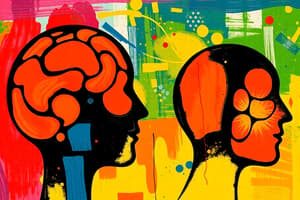Podcast
Questions and Answers
What is the primary objective of studying mental processes and behaviour in psychology?
What is the primary objective of studying mental processes and behaviour in psychology?
- To understand how the brain works.
- To improve the quality of human life.
- To explore the mysteries of the mind.
- To analyze and interpret human behaviour. (correct)
Which of the following is NOT a goal of studying mental processes and behaviour in psychology?
Which of the following is NOT a goal of studying mental processes and behaviour in psychology?
- Explanation
- Prediction
- Description
- Creation (correct)
Which level of analysis in psychology focuses on emotions, thoughts, ideas, consciousness, personality, and motivation?
Which level of analysis in psychology focuses on emotions, thoughts, ideas, consciousness, personality, and motivation?
- The Environment
- The Brain
- The Individual (correct)
- The Group
What does the acronym "FOMO" represent in the context of psychology's levels of analysis?
What does the acronym "FOMO" represent in the context of psychology's levels of analysis?
What differentiates psychology from other disciplines that study human behaviour?
What differentiates psychology from other disciplines that study human behaviour?
What is the primary focus of Wilhelm Wundt's psychological approach?
What is the primary focus of Wilhelm Wundt's psychological approach?
Which of the following concepts is associated with Sigmund Freud's psychoanalytic theory?
Which of the following concepts is associated with Sigmund Freud's psychoanalytic theory?
Which principle is NOT a focus of Gestalt psychology?
Which principle is NOT a focus of Gestalt psychology?
What is the maindrive of behavior according to B.F. Skinner's behaviorism?
What is the maindrive of behavior according to B.F. Skinner's behaviorism?
Which psychologist is credited with the concept of a hierarchy of needs?
Which psychologist is credited with the concept of a hierarchy of needs?
Who is recognized as the father of cognitive psychology?
Who is recognized as the father of cognitive psychology?
What is the significance of Francis Summer in psychology?
What is the significance of Francis Summer in psychology?
What was a primary criticism of the behaviorist approach as proposed by Noam Chomsky?
What was a primary criticism of the behaviorist approach as proposed by Noam Chomsky?
Which research challenged segregated education?
Which research challenged segregated education?
What aspect of psychology does Health Psychology focus on?
What aspect of psychology does Health Psychology focus on?
Which of the following psychologists was the first woman to earn a doctoral degree in psychology?
Which of the following psychologists was the first woman to earn a doctoral degree in psychology?
Which psychological subfield focuses on how we perceive sensory stimuli?
Which psychological subfield focuses on how we perceive sensory stimuli?
What is the primary focus of Developmental Psychology?
What is the primary focus of Developmental Psychology?
What are the Big Five personality traits often referred to as?
What are the Big Five personality traits often referred to as?
Who was the first Latina to earn a PhD in psychology?
Who was the first Latina to earn a PhD in psychology?
Which area of psychology applies theories to workplaces?
Which area of psychology applies theories to workplaces?
How does biopsychology relate to behavior?
How does biopsychology relate to behavior?
Which study is associated with Milgram, Zimbardo, and Asch?
Which study is associated with Milgram, Zimbardo, and Asch?
Flashcards
What is Psychology?
What is Psychology?
The scientific study of how our minds work, how we feel, and how we behave.
Why study Psychology?
Why study Psychology?
The primary goals of psychology are to describe, explain, predict, and control mental processes and behavior.
Levels of Analysis in Psychology
Levels of Analysis in Psychology
Psychology explores various levels of analysis to understand behavior, including brain activity, individual thoughts and feelings, and group influences.
How can I benefit from studying Psychology?
How can I benefit from studying Psychology?
Signup and view all the flashcards
What is FOMO?
What is FOMO?
Signup and view all the flashcards
Introspection
Introspection
Signup and view all the flashcards
Functionalism
Functionalism
Signup and view all the flashcards
Psychoanalytic Theory
Psychoanalytic Theory
Signup and view all the flashcards
Gestalt Psychology
Gestalt Psychology
Signup and view all the flashcards
Behaviorism
Behaviorism
Signup and view all the flashcards
Humanism
Humanism
Signup and view all the flashcards
Cognitive Psychology
Cognitive Psychology
Signup and view all the flashcards
Multicultural Psychology
Multicultural Psychology
Signup and view all the flashcards
Cultural barriers
Cultural barriers
Signup and view all the flashcards
Adaptive variations
Adaptive variations
Signup and view all the flashcards
Sensation and perception
Sensation and perception
Signup and view all the flashcards
Object permanence
Object permanence
Signup and view all the flashcards
Emotional Stability
Emotional Stability
Signup and view all the flashcards
Social Psychology
Social Psychology
Signup and view all the flashcards
Industrial-Organizational Psychology
Industrial-Organizational Psychology
Signup and view all the flashcards
Biopsychosocial model
Biopsychosocial model
Signup and view all the flashcards
Sports Psychology
Sports Psychology
Signup and view all the flashcards
Clinical Psychology
Clinical Psychology
Signup and view all the flashcards
Study Notes
Introduction to Psychology
- Psychology is the scientific study of the mind (thoughts and emotions) and behaviour.
- It aims to empirically examine the mind and behaviour, considering both biology and the environment.
Why Study Psychology?
- Studying mental processes and behaviour has four goals:
- Description: How do babies learn to talk?
- Explanation: Why do we get hungry?
- Prediction: When will we offer help to a stranger?
- Control: Reducing stress or increasing self-care.
Levels of Analysis in Psychology
- The Brain: neural activity, brain structures, and genes.
- The Individual: emotions, thoughts, ideas, consciousness, personality, and motivation.
- The Group: friends, family, and the larger population (culture)
- These levels often interact.
History of Psychology
-
Wundt and James:
- Wilhelm Wundt (1832-1920), German "Father of Psychology", used introspection (self-reflection). Volunteerism. Reaction times are important. Titchner's structuralism was a component of Wundt's work.
- William James (1842-1910), North American "Father of Psychology", focused on functionalism (function of mental activities/behaviour).
-
Freud:
- Sigmund Freud (1856-1939) was a neurologist interested in hysteria (emotional disturbances without a physical cause).
- Psychoanalytic theory emphasized the unconscious mind and early childhood experiences.
-
Gestalt:
- Wertheimer, Koffka, and Köhler focused on the whole (Gestalt) rather than the parts in understanding perception.
-
Behaviorism:
- Ivan Pavlov (1849-1936) researched classical conditioning (learning via associations).
- John Watson (1878-1958) focused on observable behavior.
- B.F. Skinner (1904-1990) emphasized consequences (reinforcement and punishment) to shape behaviour. Instrumental (operant) conditioning.
-
Humanism:
- Abraham Maslow (1908-1970): believed behaviours are influenced by motivations, from basic needs to higher-level factors (e.g., esteem). Hierarchy of Needs.
- Carl Rogers (1902-1987): developed client-centered therapy emphasizing unconditional positive regard, genuineness, and empathy.
-
Cognition:
- Ulric Neisser (1928-2012) was the founder of cognitive psychology which shifts the focus back to the mind.
- Noam Chomsky explored the limitations of behaviorism in regard to language development.
Contemporary Psychology
- Multicultural and Cross-Cultural: Understudied yet pervasive in human experience. Key figures have challenged cultural bias in IQ testing and educational practices.
- Women and Feminism: Significant contributions of pioneering women in psychology, including Margaret Floy Washburn (first woman PhD), Mary Whiton Calkins, and Mary Cover Jones.
- Biopsychology (Neuroscience) & Evolutionary Psychology: Examines biological influences on behaviours, including neural plasticity, sleep, drug use, evolutionary pressures on behaviours.
- Sensation and Perception: Understanding how we perceive sensory stimuli and how that affects our experiences. An interdisciplinary body of study.
- Cognitive Psychology: Focusing on mental processes like problem-solving, language development, and therapy.
- Developmental Psychology: Processes related to changes across the lifespan.
- Personality Psychology: Examining thoughts and behaviours that make people unique, Big 5 personality traits.
- Social Psychology: Investigating how individuals interact and relate. (Milgram, Zimbardo, Asch).
- Industrial-Organizational Psychology: Applying psychological theories to the workplace, like personnel management and organizational structure
- Health Psychology: Interactions of bio, psychological and social factors influence health outcomes, public policy, treatments.
- Sports & Exercise Psychology: Psychological aspects influencing sports performance like anxiety and physical/emotional wellbeing.
- Clinical Psychology: Diagnosing and treating psychological disorders/adjustments.
- Forensic Psychology: Psychological applications in the justice system (competency, eye-witness testimony, children's testimony).
- Limits of Psychology: Historical and social forces. Trends and objectivity.
Careers in Psychology
- Becoming a psychologist typically requires a 4-year degree. PhD programs are focused on research and teaching and allow for university-level teaching. Other branches like clinical/counseling typically focus on practice.
- Careers in psychology include academic, clinical/counseling, and applied positions in various settings such as schools, hospitals, research institutions, and other areas. (various careers and different paths).
Studying That Suits You
Use AI to generate personalized quizzes and flashcards to suit your learning preferences.




